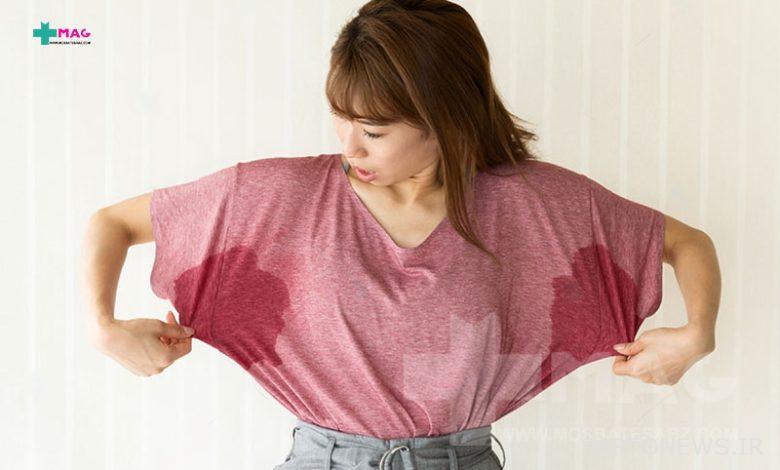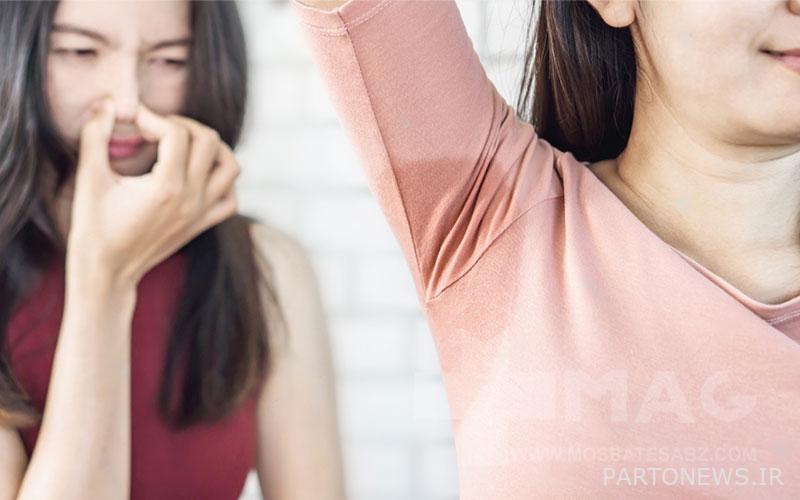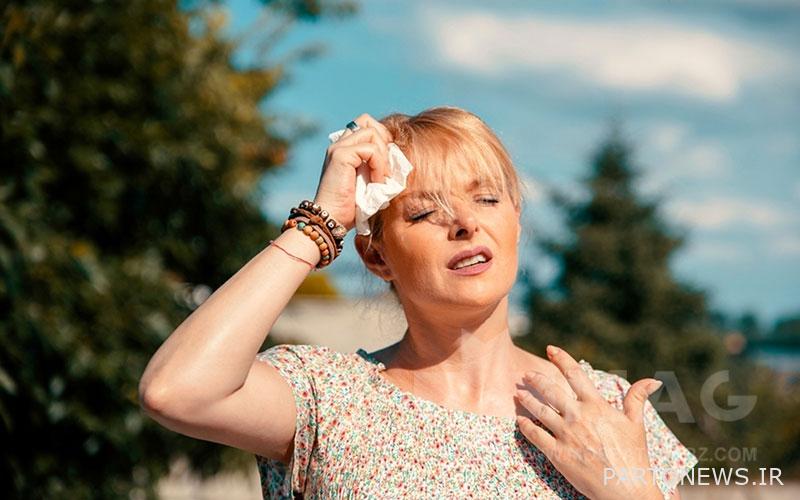What is the cause of excessive sweating?

Is excessive sweating bothering you? Have you often felt embarrassed in front of your friends because of the smell of sweat? We suggest that you stay with us until the end of this article to discover the cause of your sweating and then go to the necessary measures to improve.
Why do we sweat?
Sweating is your body’s way of cooling down and getting rid of some chemicals. Sometimes it is normal to sweat a lot; Like when you exercise intensely or when you are in an environment where the air temperature is very high.
- Why do teenagers sweat a lot? Sweat glands in teenagers are growing along with other parts of the body and it seems quite normal for teenagers to sweat more than others.
Women who are in menopause also sweat a lot due to hormonal changes and this is completely normal. But some people sweat in situations that are not normal. For example, when they don’t have any kind of physical activity or the weather is not hot, they still sweat profusely.
For these people, sweating is a big problem and it has made life difficult for them. These people always have a towel or handkerchief with them to dry their sweaty body and hands. Probably a body splash is also always in their bag so that the unpleasant smell of their body sweat does not bother others.
Cause of excessive sweating
Other causes of excessive sweating are as follows:
- Having diabetes
- Having heart failure
- anxiety
- hyperthyroidism
- Taking some medications
and hyperhidrosis, which we will define later.
What is hyperhidrosis?
Excessive, uncontrollable and abnormal body sweating is called hyperhidrosis. This type of sweating can be very annoying and embarrassing. Hyperhidrosis is very common among people. People with this problem sweat a lot even when the weather is not hot and they do not do physical activity. The intensity of sweating in these people is so high that sometimes their clothes get wet. There are two types of hyperhidrosis:
- Primary or focal hyperhidrosis: excessive sweating without a specific cause in specific areas of the body such as the armpits, hands, feet, or face.
- Generalized or secondary hyperhidrosis: excessive sweating throughout the body (often due to an underlying medical problem)
Primary hyperhidrosis usually starts in childhood or adolescence and occurs at least once a week. But secondary hyperhidrosis usually starts in adulthood and is mostly observed during sleep.
What are the symptoms of excessive sweating?
You may ask how we know that our sweating is abnormal or normal! If you have the following symptoms, you are sweating excessively:
- If perspiration is visible: clothing is wet or sweat is dripping from the body.
- Difficulty holding a pen, working with a computer mouse or keyboard.
- Keeping the skin moist for a long time (probably after that the skin will be soft, white and flaky.)
- Frequent skin infections in parts of the body that sweat.
If you sweat a lot, you should pay more attention to your personal hygiene. Try to take a shower as soon as possible and be sure to buy a body wash that is suitable for your skin.

Treatment of excessive sweating
If you sweat so much that your daily life is affected, be sure to consult your doctor to suggest an effective solution. Commonly recommended treatments for excessive sweating are as follows:
Topical antiperspirants
These drugs must be prescribed by a doctor and the instructions for use are such that they should be used before going to bed.
Using electricity to treat profuse sweating
There is a device called iontophoresis that uses a weak electric current to enter the body through the skin. To use this device, you need to put your hands or feet in a tray with some water in it. The electric current produced by this device causes a tingling sensation in the skin. According to the doctor’s order, the use of this device for the treatment of excessive sweating should be done in several sessions to be effective in the end.
botax injection
In this method, Botox is injected in areas of the body that have a problem with sweating; Like armpit or hand. Botox temporarily blocks the nerves that cause sweating, thereby improving the problem of excessive sweating. Pay attention that this treatment is not a permanent solution and the person must repeat the treatment after some time.
Medicine for excessive sweating
Some medications may help reduce sweating by preventing the stimulation of sweat glands or reducing stress. You must consult a doctor before using these drugs.
Electromagnetic energy
In this method, after anesthetizing the desired position (for example, armpit glands), the doctor heats that part of the body using electromagnetic energy. Doing this may take about 1 hour and the treatment should be done in several sessions.
Surgery to treat sweating
If none of the above treatments are responsive, finally, the doctor may perform surgery to remove the sweat glands or destroy the nerves leading to the sweat glands.
What are the side effects of excessive sweating?
When you sweat a lot, you may experience the following side effects:
- Unpleasant body odor: Unpleasant body odor after sweat is because as a result of excessive sweating, the natural flora of the skin changes and the increase of bacteria on the surface of the skin causes an unpleasant odor.
- Infection: People who sweat a lot are more prone to skin infections.
- Negative social impact: People whose clothes are constantly wet and have the feeling that their body smells bad, constantly feel shame and in many cases prefer not to participate in social activities at all.
What is the cause of head and neck sweating in sleep?
Sweating of the head and neck in sleep may be due to various reasons. Below, I will describe some of these reasons:
- 1- Weather conditions: In hot and humid seasons, the body tries its best to sweat and evaporate water from the surface of the skin in order to cool down. This can lead to sweating of the head and neck while sleeping.
- 2- Internal diseases: Some diseases such as thyroid gland diseases, cardiovascular diseases and diabetes can cause increased sweating in the body.
- 3- Use of special drugs: some drugs such as blood pressure regulating drugs, anti-depressants, anti-allergy drugs, etc. can cause excessive sweating in the body.
- 4- Stress and anxiety: Stress and anxiety can increase the activity of sweat glands in the body and thus accelerate the sweating of the head and neck in sleep.
- 5- Consumption of stimulants: consumption of substances such as coffee, black tea, alcohol and cigarettes can increase sweating in the body.
- 6- Low levels of testosterone in the blood: this factor can also cause night sweats.
If the sweating of the head and neck during sleep is severe and persistent and is accompanied by other symptoms such as fatigue, shortness of breath, chest pain, etc., it is better to consult your doctor.

What is the cause of sweating in a cold?
Sweating in a cold may be due to several factors:
- 1- Fast breathing: If your breathing becomes fast during a cold, the body’s greatest effort to warm the body is done by sweating. As a result, sweating occurs in colds.
- 2- Fever: If a cold is accompanied by a fever, the body tries to lower the body temperature through sweating and return it to a normal state.
- 3- Increased activity of sweat glands: If the body is exposed to extreme cold, the sweat glands become more active to maintain body temperature, and this makes you sweat a lot.
- 4- Taking certain drugs: some drugs such as blood pressure regulating drugs, anti-depressants, anti-allergy drugs, etc. can increase sweating in the body.
Which drugs cause sweating?
Many medications may cause increased sweating in the body. Below I mention some of these drugs:
- Antidepressants: such as sertraline and fluoxetine.
- Anticonvulsants: such as carbamazepine and phenobarbital.
- Anti-allergic drugs: such as Allerox, Cetirizine and Chlorpheniramine.
- Influenza treatment drugs: such as amantadine and Rimantadine.
Other drugs: drugs such as methadone, metoclopramide, etc. may increase sweating in the body.
What is the sign of cold sweat?
A cold sweat is a sweat during which you feel cold. The cause of this problem can be one of the following:
- Accidental shock due to sudden drop in blood pressure
- Infectious diseases such as septicemia, influenza, asthma, etc.
- stroke
- Heart diseases such as heart failure or arrhythmia
- Stress and anxiety
Why do menopausal women sweat a lot?
Menopausal women may experience profuse sweating due to changes in their body’s hormone levels. In menopausal women, the level of estrogen and progesterone hormones in the body decreases. These hormonal changes may increase the activity of sweat glands in the body.
In addition, menopausal women may face other problems such as heart diseases, diabetes, etc., which cause excessive sweating. Some menopausal women may experience severe pain, night sweats, insomnia, and other menopausal symptoms. These symptoms may be treated with hormone replacement therapy and other medications. Consult your doctor about this.

Home remedies for excessive sweating
Excessive sweating may be caused by diseases such as hyperthyroidism, heart diseases, infectious diseases, etc. Therefore, if your sweating is severe and persistent and is accompanied by other symptoms such as shortness of breath, chest pain, etc., it is better to consult your doctor and receive the appropriate treatment for your symptoms.
But considering that some factors such as stress and anxiety may cause increased sweating, some home remedies may be effective in reducing sweating. Below are some of these solutions:
- Consumption of green tea: due to its antioxidant properties
- Consumption of natural extracts: such as thyme and yarrow
- Consumption of food with a cold temperament
- Exercise: due to its effect on reducing stress and anxiety
- Meditation: To help reduce stress and anxiety.
It is important to know that these solutions are only used as auxiliary methods to reduce sweating, and if there are diseases that cause excessive sweating, it is necessary to see a doctor and follow his instructions.
last word
Before we end this article from the collection of articles of Positive Green Online Pharmacy magazine, in this section, we will address your common and common questions about the cause of excessive sweating and ways to treat it. Stay with us so that nothing is left unsaid.
Frequently asked questions about sweating
What is the cause of excessive head and face sweat?
Cranial hyperhidrosis can be one of the causes of excessive sweating in the head and face. Colds, respiratory infections, weather conditions, anxiety and the use of certain medications are also considered to be the causes of excessive sweating of the head and face.
What is the cause of sudden sweating in women’s body?
Hormonal changes during menstruation and pregnancy, and most importantly, menopause, are the most important causes of sudden sweating in women. Other reasons such as stress and anxiety, suffering from some diseases and taking some medicines can also be involved.
What is the sign of a child sweating in his sleep?
An increase in body temperature during the night and the body trying to cool down, viral and bacterial infections, blood or heart diseases, breathing problems and anxiety and stress.
Please rate this article
[مجموع: ۱ میانگین: ۵]


